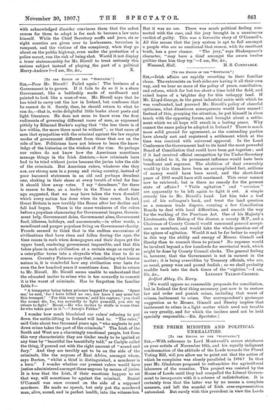[To THE EDITOR OP THE " SPECTATOR." J SIB, — Irish affairs
are rapidly reverting to their familiar chaos. The extremists on both sides are having it all their own way, and we hear no more of the policy of peace, conciliation, and reform, which for but too short a time held the field, and raised hopes of a brighter day for this unhappy land. If Mr. Lloyd-George, in the great industrial crisis with which he was confronted, had pursued Mr. Birrell's policy of cheerful optimism, what disastrous consequences would have ensued ! Instead of this, grasping the situation, he put himself in close touch with the opposing forces, and brought about a settle- ment which we all hope will result in a lasting peace. Why cannot the same policy be adopted in Ireland P There is much more solid ground for agreement, as the contending parties have already met and registered a settlement which at the time was received with universal approval. In the Land Conference the Government had to its hand the most powerful Board of Conciliation that could have been got together; and if it had received official recognition by the Under-Secretary being added to it, its permanent influence would have been beneficent and supreme. The abolition of dual ownership would by this time have been an accomplished fact, millions of money would have been saved, and the short-lived peace of 1903 would have still continued.. This error , cannot now be retrieved; but is there no remedy for the, present state of affairs ? " Virile agitation " and " coercion " are apparently to be left again to fight it out. A simple remedy lies to Mr. Birrell's hand. Let him take a leaf out of his colleague's book, and treat the land question as a , common trade dispute, creating a few Conciliation Boards to deal with local difficulties, and smooth the way for the working of the Purchase Act. One of his Majesty's Lieutenants, the Bishop of the diocese, a county M.P., and a Chairman of County Council would command general accept- ance as members, and would take the whole question out of the sphere of agitation. Would it not be far better to employ in this way the ability and energy of Messrs. Ginnell and Sheehy than to commit them to prison ? No expense would be involved beyond a few hundreds for secretarial work, which might be done by County Council clerks. The general feeling is, however, that the Government is not in earnest in the matter ; it is being overridden by Treasury officials, who are, as usual, penny wise and pound foolish ; so we shall probably muddle back into the dark times of the "eighties."—I am, [We would oppose no reasonable proposals for conciliation, but in Ireland the first thing necessary just now is to restore law and order and punish crime, including that worst of crimes, incitement to crime. Our correspondent's grotesque suggestion as to Messrs. Ginnell and Sheehy implies that incitement to crime is a light matter which need not trouble us very greatly, and for which the inciters need not be held specially responsible.—En. Spectator.1


















































 Previous page
Previous page